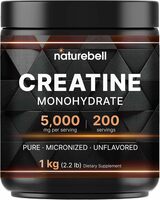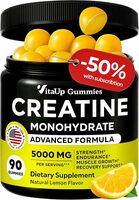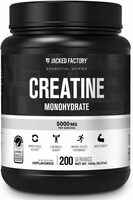Are you looking to boost your strength training and promote more muscle growth? Let Buyer's Report help, with our expertly-reviewed selection of the best creatine supplements for men available today.
 Nutricost
Nutricost
 Nutricost
Nutricost
 Lunakai
Lunakai
 NatureBell
NatureBell
 BioTrust
BioTrust
 VitaUp
VitaUp
 Jacked Factory
Jacked Factory
 Sports Research
Sports Research
 Nutricost
Nutricost

Spending time inside a gym is one of the best things you can do for your body, and when combined with a healthy diet and consistent exercise routine, it can lead to significant improvements in overall health and well-being. Whether you're aiming to build muscle, improve cardiovascular fitness, or simply looking to destress after a long day, the gym offers a space where you can focus solely on your physical health and push yourself to new limits, giving you the opportunity to achieve all of your big goals. However, for many individuals, achieving specific fitness goals may require additional support beyond just the hours you put in at the gym, and in addition to fueling your body with a well-rounded and balanced diet, you may need the extra support that a potent supplement can provide. For some people, this may mean adding a protein powder to your daily routine in order to hit your necessary goals, but for others, a more specialized supplement like creatine may be the answer. Known for its ability to boost performance, increase gains, and even enhance cognitive function, creatine has become a staple supplement in the world of fitness, and if it’s something you’ve been considering, but are still a bit unsure about, then this article can help you better understand exactly what it is, and what it may be able to do for you.
If you’ve ever spent time browsing through bodybuilding forums or watching workout videos, then you’ve likely heard creatine being mentioned time and time again. As a naturally occurring compound, creatine is something that can be found in foods such as red meat, fish, and poultry, and it’s used primarily by the body to help provide energy to your cells during moments of intense exertion and activity. When you lift heavy weights, for example, your muscles rely on something called ATP (adenosine triphosphate) to give them the power they need to push through those demanding exercises, and without ATP, they would quickly fatigue and fail. Unfortunately, how much ATP your body is able to generate is quite limited, and in order to regenerate at a faster and more effective rate, you need to be supplying your cells with adequate levels of creatine. Working in tandem with the body's natural energy production processes, creatine plays a vital role in replenishing ATP stores, and this is why it is used by many athletes, bodybuilders, and fitness enthusiasts who are hoping to build more muscle and get stronger. However, the amount of creatine you can access through food alone is often insufficient to meet the demands of intense physical activity, which is why many individuals choose to supplement with a store-bought creatine powder.
By choosing to add a store-bought creatine powder into your workout routine, you may be able to take advantage of a range of potential benefits, and many people find it to be an essential aspect of reaching all of their fitness-related goals. However, it is important to keep in mind that research into creatine is still limited, and like with any supplement, you may want to consult with a healthcare professional before you begin taking it. If you do feel it’s the right choice for you, then it is very easy to begin incorporating it into your pre or post-workout routine, and when used correctly, some of the main advantages it offers users are:
One of the core reasons why people opt to supplement with creatine is that it has been shown to be a key factor in increasing muscle mass and strength, particularly when combined with resistance training. By increasing the availability of phosphocreatine in the muscles, creatine enables ATP to regenerate faster, which ultimately can help you accomplish more reps without fatiguing. On top of doing more reps, you may also find that creatine enables you to lift heavier weights than you normally would be able to, and over time, this is what will lead to that noticeable increase in your overall mass and strength levels.
After you finish a grueling workout, your body doesn’t simply bounce back immediately, and there is going to be a recovery period where your muscles will need to rest, recuperate, and work to repair some of the damage that was caused to them. Thankfully, Creatine may be able to help speed up this necessary recovery time so that you can feel better and get back to your training routine sooner, and it can also reduce muscle damage and inflammation immediately post-exercise.
In addition to its well-known effects on strength, muscle mass, and recovery, recent studies have now begun to explore creatine's potential impact on both brain function and mental performance. Potentially influencing various aspects of cognitive performance, including memory, attention, and reasoning skills, this potent supplement ensures there is adequate ATP available for essential neural activity, which supports optimal cognitive function. In simple terms, it may help your brain work better, allowing you to think more clearly, remember things more easily, and stay focused on tasks for longer periods of time, ensuring you’re just as strong mentally as you are physically.
Alongside the benefits of creatine, there are also some potential side effects that users should be aware of, and you’ll want to take this into consideration before you start adding this supplement into your routine. For example, those with more sensitive stomachs may find that the powders can cause some gas and bloating, and this can not only be uncomfortable, but may also affect your ability to stick to your fitness routine consistently. Additionally, some individuals may experience more severe gastrointestinal issues, such as diarrhea, especially when starting creatine supplementation or when using high doses. It's also important to note that creatine supplementation may lead to weight gain in some individuals due to increased water retention within muscle cells. While this initial weight gain is often temporary and related to water, rather than fat, it's essential to be mindful of any changes in body composition. If you do have any concerns or questions, it's always best to speak with a medical professional directly, as they can provide personalized advice based on your individual health status and medical history.
Once you decide that you’re ready to start incorporating creatine into your workout routine, the next step in the process is going to be finding the version that works best for your body. Creatine isn’t a one-size-fits-all supplement, and in fact, that are actually multiple types available for you to choose between. The main differences between the options will depend on factors such as solubility, absorption rate, and potential side effects, and you may also find that certain versions are more easily found on store shelves than others. Before settling on any specific supplement, you will want to take the time to thoroughly research the pros and cons of each one, and the main creatine types you should explore will include:
The most common type of creatine is creatine monohydrate, which is widely researched and considered to be a highly preferred supplement option. Referred to as the gold standard, creatine monohydrate truly shines for its cost-effective pricing, excellent solubility, and proven benefits, and it’s often trusted by bodybuilders and professional athletes alike. Extensively studied, and consistently shown to improve strength, muscle mass, and exercise performance, its effectiveness is well-established and it’s very easy to incorporate into your routine since it can be added to almost any beverage without creating unpleasant clumps or sediment.
Creatine Ethyl Ester (CEE) is a form of creatine that has been chemically modified to enhance its bioavailability, and unlike creatine monohydrate, it’s more fat soluble which means it may be better absorbed and utilized by the body. For those who find creatine monohydrate causes gas, bloating, and other abdominal discomforts, CEE can be a more well-tolerated alternative that can still increase your muscle creatine levels and lead to improved performance when taken correctly.
Creatine Hydrochloride (Creatine HCl) is another form of creatine that has gained attention in the fitness and supplement community, and for good reason. By combining creatine with hydrochloric acid, this formulation aims to enhance the solubility and absorption of creatine within the body, and this means it could offer several advantages including reduced gastrointestinal discomfort for individuals who tend to have more sensitive stomachs. However, research is still on-going when it comes to creatine hydrochloride, so whether or not it is as effective, or more effective, than other types is still up for debate.
Magnesium is an essential mineral that your body depends on for numerous vital functions, including energy metabolism, muscle contraction, nerve transmission, and protein synthesis. When combined with creatine, it forms Creatine Magnesium Chelate (CMC), which aims to optimize the delivery and utilization of both nutrients within the body. This synergistic combination may enhance ATP production, leading to improved energy levels and athletic performance during intense exercise, and may also help with things such as muscle coordination and movement. The downside, however, is CMC may be one of the more expensive versions of creatine, so if you’re on a tight budget and plan to take this frequently, then it may not be the ideal choice due to the increase in price.
Creatine is available in a few different formats, with the most common being a powdered supplement that can be mixed into any preferred beverage before or after your workout. In this format, it’s incredibly easy to take as needed, and you would simply mix your established dosage into a liquid and then drink it for quick and noticeable results. How much you take will depend on factors such as your size, activity level, and individual goals, however, a standard dose will typically be around 3-5 grams per day for the average adult. In addition to taking creatine as a pre or post-workout supplement, you can also engage in a practice called loading, which may help to maximize the benefits of this potent supplement. Loading involves taking a higher dose of creatine for a short period, usually around 20 grams per day, divided into several smaller doses, for 5-7 days, which aims to saturate your muscles and ideally experience benefits faster. Whether or not loading is necessary or effective, however, is up for debate, and it isn’t something you have to be doing unless you and a medical professional have agreed that it is the right avenue for your body.
Like with many supplements, creatine has the potential to make a significant difference in your health and wellness routine, but it is important that you fully understand all the options, types, risks, and benefits before incorporating it into your regimen. When used correctly, it may be able to help you with muscle strength, athletic performance, recovery time, and even cognitive function, but you’ll want to ensure you’re pairing it with a healthy diet and consistent exercise in order to maximize those results. Thankfully, there are numerous options available to you if you do decide creatine is right for you, and with a little patience and research, you’ll easily be able to discover the best version and format that fits seamlessly in with your pre or post-workout routine. Remember to start with a conservative dosage, gradually increase if needed, and monitor how your body responds, and you should always stay hydrated whenever you use a creatine supplement. Additionally, you may want to consult with a healthcare professional if you have any questions or concerns, as they will be the most equipped at providing personalized advice that is tailored to your individual needs and health status.